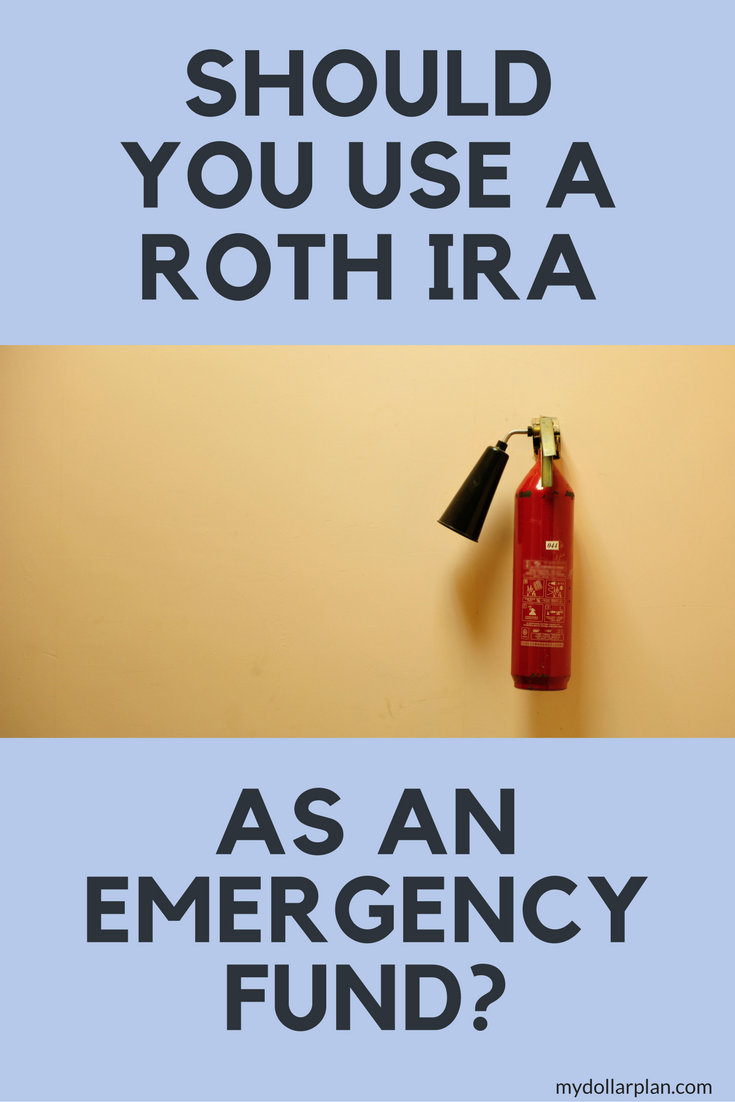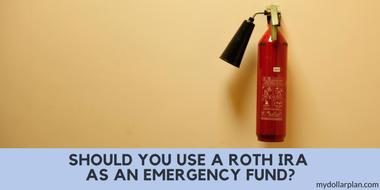Should You Use a Roth IRA as an Emergency Fund?

Because of the flexibility of a Roth IRA, many people consider using their Roth as an emergency fund (or depositing their emergency fund into a Roth if you prefer to look at it that way).
Should you use a Roth IRA as an emergency fund?
Using a Roth IRA as an Emergency Fund
There are pros and cons to using your Roth IRA as an emergency fund. Using this strategy is certainly not for everyone. Read on to decide if it might work for you.

Background on Roth IRAs
As we have discussed many times before, Roth IRAs basically rock. They’re the gold standard of retirement accounts.
You pay taxes on your money before contributing, put the money away for years, and NEVER pay taxes on withdrawals taken in retirement – so your gains are tax-free.
In addition, the money you put in is always yours to take back, tax- and penalty-free. With other accounts, your money is locked up until you turn 59 1/2 (with some exceptions). Withdrawals at that time are taxed as ordinary income, and if you want your money sooner, you’ll have to pay a 10% early distribution penalty as well.
In addition, Roth IRAs are not subject to required minimum distributions while you are living.
Could You Use Your Roth IRA as an Emergency Fund?
If you’re currently under-funding your retirement accounts, it’s probably because you have too many goals and can’t fund them all. You have to prioritize, and somehow retirement always gets pushed to the bottom – since, after all, it’s light-years away.
What’s more, everywhere you look someone is pushing you to beef up your emergency fund – and you just can’t do that AND fund retirement accounts.
Why your Roth SHOULD be your Emergency Fund…
- You can save for retirement now instead of later. If you wait to save for retirement until you have a fully-funded emergency fund  (6-9 or even 12 months of living expenses), you might be waiting for years. If you decide to let your Roth BE your emergency fund, you can start contributing right now. Since you can only contribute $5,500 per year, missing years can really have an effect on the total amount you have available at retirement.
- You can possibly enjoy higher gains – and they’re tax free. If you put $5,500 (the Roth IRA limit) into a savings account right now, it will earn you around 1% per year, and you’ll have to pay taxes on that amount. If you put it into a Roth and invest in some good index funds, you might see much higher gains, and they’ll be tax free.
- You might rethink your definition of “emergency.” Most people keep emergency funds in a savings account, or maybe CDs. It can be a little too easy to tap into those funds if, say, you’re a little over your vacation budget or forgot to factor your child’s birthday party expenses into this month’s budget. Keeping the funds in a harder-to-access Roth IRA might make you rethink spending that money.
- In a true emergency, you’ll tap it anyway. Regardless of how much we segment our money (on paper or in actual separate accounts), in a truly massive emergency, all funds are emergency funds. If you have a small Roth and a small emergency fund and your emergency fund runs out, you’ll likely take what you can out of the Roth anyway. You might as well benefit from putting it in the Roth now (for reasons 1 and 2 above).
…And why your Roth shouldn’t be your Emergency Fund
- You could be sacrificing your future. The biggest reason for not using your Roth as an emergency fund is because it’s a retirement account, made up of funds you should use when you actually retire and have no other source of income. If you take it out now, it’s not growing for later. And you can’t count on being able to put it back later since the maximum contribution is fairly small – once you take out the money, it’s likely out for good.
- It’s not guaranteed. If you’re putting money in a Roth, you’re probably investing at least some portion of it into the stock market. And if there’s anything we need to know, it’s that stock market gains are NOT guaranteed. If you put in $5,500 this year, it might be worth $6,000 next year…or it might be worth $4,000 or less. So while you are allowed to take out amounts up to the amount you contributed, there’s no guarantee that amount will actually still exist when or if you need it.
- It’s not liquid. If you have a true need-cash-now emergency, a Roth IRA won’t help you. It will take at least a few days to make the withdrawal and have the funds wired to your bank.
Discussion
I think a Roth IRA should never be your primary emergency fund OR your primary retirement account. After all, you can only put in $5,500 per year (adjusted for inflation).
Even if you save the maximum every year, it’s probably not going to be enough to completely fund your retirement. Instead, you’ll likely rely on some combination of Social Security, a 401(k) or other employer-sponsored plan, and (if you’re lucky) an employer pension.
If your Roth represents a small portion of your overall retirement portfolio, it’s probably okay to let it double as your emergency fund – with one caveat. No matter what, I would always keep at least $1,000 in an easily-accessible (read: brick-and-mortar) bank account. You want to be able to hit the bank or ATM if you really need cash in a pinch.
Beyond that, I would try to contribute as much as possible to a Roth – while promising to only tap it for true, TRUE emergencies (like a major illness, job-loss or emergency room trip). You should still try to build up a dedicated emergency fund over time, but rest easy knowing that you’re not putting off retirement savings because of it.
What do you think – have you successfully used your Roth IRA as an emergency fund?
More Roth Topics
- What is a Backdoor Roth IRA?
- To Roth 401k or Not to Roth 401k?
- Should You Do a Roth Conversion?
- How to Make Early Roth IRA Withdrawals
- Open a Roth IRA for your Teen
- Strategy to Contribute More Than Roth IRA Limit Allows
- Roth 401k: What Is It?
- 11 Unusual Roth IRA Strategies
- Can You Have a Roth 401k and a Roth IRA at the Same Time?





I think you have to have your contributions invested for 5 years before you can withdraw them penalty-free. That is another con.
Squeezer,
Actually, you can withdraw your contributions at any time. The five year waiting period is for withdrawal of earnings.
I keep it mine as a backup emergency fund, now, but it was initially my only emergency fund.
I guess I’m always confused by the drawback of the money not being liquid. I am unable to envision a scenario where a 5 business day turn around would be unacceptable.
In my experience with family emergencies, it has taken months for bills to settle, plane tickets were bought on credit cards & that portion of the bill wasn’t due for ~20 days. I just can’t figure out under what circumstance I’d need to liquidate a large amount of money within 24 hrs… unless it was a ransom?
Given that most of my banking is online and not through local banks, the same argument of liquidity could be made of my online bank checking account.. Even if I cashed it out, it would likely take a couple days atleast to receive the check.
Do you have any examples? I’ve always wondered what I was missing..
Good question. I generally agree with you that larger sums of money can be paid via credit card, payment plan or down the road. I advocate keeping $1,000 in cold hard cash (in a bank, not under your mattress!). That’s enough to hand someone cash if they need it in a pinch or pay a tow truck or mechanic that doesn’t take cards. Those are the only situations I can really think of where you actually need cash right away. Also, that is assuming you have access to a credit card or other means of payment. If you don’t have available credit either because you don’t carry credit cards or because you’re at your limit, you would need access to cash fast.
I think the other reason that I see liquidity as an issue is because you never know what could go wrong or when. If an emergency strikes on Monday at noon, I can call/email/initiate an online transfer from my Roth provider (or online bank account) and assuming everything goes smoothly, have my money by Thursday. But if it’s Friday at midnight, the request won’t even start to be processed until the following Monday. And if there’s a holdup with paperwork or your receiving bank, you might be looking at a week plus. Again – not usually an issue – but what if it is.
Finally, there’s the argument that in a truly catastrophic event, payment networks might be down or non-cash payments simply not accepted.
In general though, I think you are right that liquidity is not a huge issue.
I don’t understand the premise of this article. If you use your Roth as your emergency fund, you will have to pay 10% unless you setup SEPP (which is not advisable), or if you have an emergency medical costs. Why? Why focus your emergency fund so that you “have” to take a tax hit just to use it? For many people, an emergency fund is something you hit when things go awry, or have a huge expenditure (like property taxes or insurance premiums). Why would you setup your life so that “Oh I have pay $2500 in property taxes, lets take it out of my Roth and pay an extra $250 in taxes this year?”
Hi Big-D,
Actually you will only have to pay penalties if you withdraw earnings. If you withdraw contributions, it is always tax and penalty free. The rationale for putting the money into a Roth is that you can bank the earnings for retirement while still having the contributions for emergencies.
The other thing I would say is that property taxes and insurance premiums are known expenses, not emergencies. They should be saved for using more traditional methods like savings accounts or CDs.
I’ve actually thought a lot about this before. What I came up with is a balanced saving plan for both accounts, but then at tax time every year I “top off” my Roth contributions using funds from my EFund. Usually I transfer over about 1-1.5k right about, well now.